Do you remember the “boy in the bubble?”
David Phillip Vetter was born in Houston, Texas on September 21, 1971. His story was often in the news throughout the 1970s for he was born with SCID, Severe Combined Immune Deficiency (pronounced “skid”) and was placed inside the first of many sealed environments — “bubbles” — within minutes of his birth.
This story captivated me throughout the 1970s until he died in 1984 and not just for the human interest it held. In the spring of 1973, I too had a newborn named David. I followed, both fascinated and horrified, this little “boy in the bubble.” It continues to captivate me.
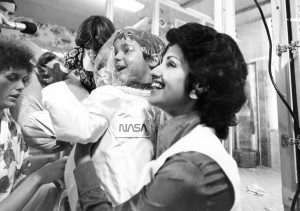
Why am I talking about David today? It was on February 7 (1984) that this then-twelve-year-old boy touched his mother for the first time. He died two weeks later of lymphoma caused by an unexpected virus in the blood of his bone marrow donor.
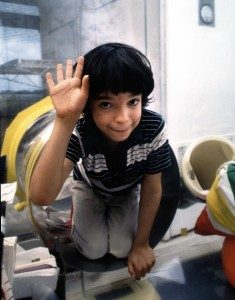
The story of David’s life garnered worldwide attention, but it’s been The Houston Chronicle that continues to cover the story as more and more children born with SCID get a happier ending because of the advances made possible from David Vetter’s short life.
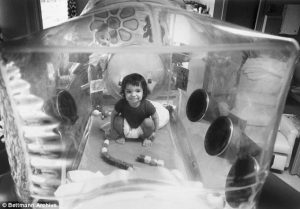
His life was not without controversy.
As you know, I highlight stories that show the power of culture on individuals, generally without our awareness. And David’s story is such a one. He was born into a culture of medical optimism. Houston, Texas had seen the first separation of conjoined twins (1964), the first heart transplant (1968), and the first successful treatment of pediatric respiratory failure with an at home mechanical ventilator.
With David, they fully expected to see the first successful treatment of SCID. And they expected it fairly quickly, at first.
At best, this theory goes, he was the innocent victim of an unwarranted optimism, a pervasive sense of hope that, after the reality set in, trapped him in an untenable situation. At worst, he was the victim of medical hubris, “a classic example of doctors promising more than medicine could deliver?” as one person put it in this documentary from American Experience, Biography. (It’s 55 minutes long)
Or, was he the fortunate recipient of technological triumphs that gave his family twelve years with him that they’d otherwise not have had?
That is the verdict in The Story of David, from the Immune Deficiency Foundation.
SCID afflicts between 40 to 80 babies every year and is still fatal if left untreated. But today, there is hope through bone marrow transplants or stem cell transplants, if diagnosed within the first three months, thanks to the time doctors had with David. And from David’s death, we’ve learned of the connection between viruses and cancer, a causal relationship that had produced numerous breakthroughs since.
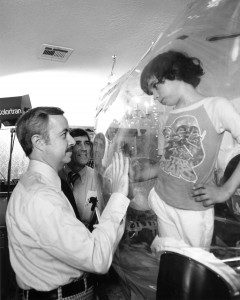
Want more information? Try these links:
David’s epitaph reads: “He never touched the world. But the world was touched by him.” He would have turned 47 later this year.
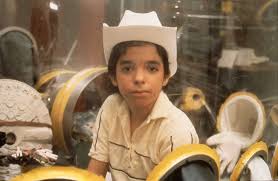
How about you? How do you remember David Vetter?
REMINDER: I hope you’ll check into the We Love Memoirs Facebook group this Sunday when I’ll be talking about my books, my experiences in the Peace Corps, the process of writing, the craft of memoir writing specifically, and any other questions the members might toss at me. Who knows, if someone asks me about Elton John I may repeat the story of how I nearly married the man so long ago. To join (even for the day) just find the image for it in the sidebar there to the right, then scroll up a bit.
Marian Beaman
Oh, my Janet. This story got by me. If I remember David at all, it’s a vague memory. I was on the road with my itinerant artist husband and two babies, one about the age that David would be now. You could say I was living in the bubble of our 25 foot travel trailer with little access to news.
The prevalence of compromised immume systems is a hot topic these days. I certainly get an education when I click on your website each week. Thank you!
Marian Beaman recently posted…Not Lost But Gone Before, Hope’s Message
Janet Givens
Hi Marian. I didn’t see many stories, but whenever I did, my heart always skipped a few beats. I felt the powerlessness that surely his mother must have felt being unable to help him. When, he died at 12 I also knew he’d been showing normal adolescent rebellion. I had actually thought they’d simply opened the bubble and allowed nature to take its course. In researching for this I learned a different story.
Thanks for starting us off.
Janet Givens recently posted…Remembering David Vetter
Marian Beaman
👍
Marian Beaman recently posted…Not Lost But Gone Before, Hope’s Message
Laurie Buchanan
Janet — I remember David Vetter because of the 1976 John Travolta movie, “The Boy in the Plastic Bubble.” I’m not sure if the movie was based specifically on David, but that’s when he came to my attention.
I heartily echo Marian’s sentiments, ” I certainly get an education when I click on your website each week.”
Laurie Buchanan recently posted…Take Care
Janet Givens
Oh I’m so sorry that was your introduction. I never saw the movie, only short clips in some of those videos I linked to. I found it hard to believe they’d cash in on the family’s misery.
Thank you for your kind words. I do fancy myself in the role of journalist some days. (I think it was blog guru Jeff Goins who had us identify which of five possible roles we took on with our blogs. Journalist was one I identified with. But there was a second, which escapes me at the moment. I do want to challenge readers to think about things differently. Not sure that’s straight journalism.)
Janet Givens recently posted…Remembering David Vetter
Kathleen Pooler
Hi Janet, I echo Marian’s and Laurie’s shout out to you for educating and enlightening us weekly with a wide variety of human interest stories. I do remember the “Bubble Boy” as my daughter was born in 1973. That’s an interesting perspective about medical optimism but, in the end, the twelve years he was with us yielded important information for treatment today.
Janet Givens
That is certainly how I’ve seen it in doing this piece, Kathy. I was bothered actually by the one “ethicist” on the video who mentioned “hubris” as being a motivating force. It was certainly not that simple.
It’s the kind of story that everyone who had an opinion, had a strong one. I guess I believed then that if they had him in the bubble, there was good reason for it. I never questioned it back then. Never questioned much back then. I had no opinion, only the feeling of overwhelming sadness.
Janet Givens recently posted…Remembering David Vetter
Susan scott
I continue to wonder why these peculiar viruses affect the in utero foetus. I do remember the boy in the bubble. I can hardly imagine such a life for the boy and family. Thanks Janet.
Janet Givens
Yes indeed. Thanks, Susan.
Janet Givens recently posted…Remembering David Vetter
Merril Smith
I remember hearing about “the boy in the bubble,” but I could not have put a name to this image. It always seemed so sad to me–for him and his family–to never touch. Thank you for sharing his story.
Merril Smith recently posted…If (We Could Fly)
Janet Givens
Thanks for stopping in. Loved your recent poem, If (we could fly). So glad you shared the link.
Janet Givens recently posted…Remembering David Vetter
Tim Fearnside
Thanks, Janet. I remember hearing about the “boy in the bubble” as a kid growing up in the ’70’s. I was only a few years older than him, and remember feeling a strange mix of horror and fascination with the occasional stories I’d hear. As a country kid, I ran wild and free, often in bare feet, and was hard to drag indoors. The thought of living in a “bubble” was almost beyond my ability to comprehend or imagine. As an adult and, now, parent, I look back on David Vetter with deep sadness and empathy.
Tim Fearnside recently posted…One Big Lie
Janet Givens
“Deep sadness and empathy”. Exactly why you’ve so quickly become one of my favorite people, Tim. Thanks for adding your voice here.
Janet Givens recently posted…Remembering David Vetter
Amelia
Yes, I do remember the boy in the bubble. To make advances in medicine (or anything) lessons have to be learned and scarifies made. I think one of the worst thing in the world when you can’t help your child. Thanks for sharing.
Janet Givens
Absolutely. I find myself focusing on the advances that have come about since then, especially the virus-cancer connection. Sacrifices — such an important word and so many ways to look at it. Of course, we often never really know their value until years later. Thanks for adding your voice here.
Gloria
Oh yes, I remember David. Just like Tim Fearnside, I was a country child with the freedom to explore the outdoors and only went home when hungry. The story was intriguing and I remember feeling sad for him because he was sick and had to live inside this bubble. I never knew the full details of his illness though. There’s so much we forget over time, isn’t there.
Janet Givens
Indeed there is. Keeping memories alive — now that would make for an intriguing blog for someone. Thanks for joining us, Gloria.
Erin - Unbound Roots
I remember hearing about David, but didn’t know much about him or his disease, except that he lived in a “bubble”. This informative post is a great write-up, but what a sad situation. Thank goodness for medical advances.
Janet Givens
Thank you Erin, and yes indeed, we continue to learn much. It is a sad story. I’m glad I had the chance to share it again.
Silvia
Such a touching story. I had never heard about David before (in Italy this story didn’t get popular) but I thank every day the medicine research for making such improvements through the years, and it really breaks my heart thinking about those unfortunate (especially if children) that didn’t have the time to wait for a cure to their disease.
Silvia recently posted…Soft chocolate chips and yogurt cookies: ready in only 30 minutes
Janet Givens
Hello Silvia and welcome. I’m so glad I could bring David’s story to Italy. You’ve got me thinking how closely entwined sadness is with relief. How relieved the parents of babies born today with this disease must feel. How joyous. I think my sadness expands to encompass all of that joy. Hmmmm.
Janet Givens recently posted…My Amygdala Makes Me Do It: The WP Wars, Part II